Peter MALONE
Saturday, 18 September 2021 19:32
Man Between, The
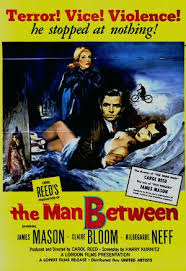
THE MAN BETWEEN
UK, 1953, 93 minutes, Black and White.
James Mason, Claire Bloom, Hildegarde Neff.
Directed by Carol Reed.
The Man Between is a Carol Reed thriller from the period of The Third Man and An Outcast of the Islands, but is not as good as either of these films. It is an interesting exercise to look back now at drama on the Berlin situation as seen by the eyes of the early 50's. (Some comparisons could be made with The Spy Who Came in from the Cold, 1965, or Torn Curtain, 1966.)
Reed evokes the atmosphere of Berlin (as he did for post-war ruined Vienna in The Third Man) and the problems of the man with several allegiances. Again, the continentals are the complex characters, the British, rather straightforward, bewildered by intrigue.
Acting and directing are excellent; the film is worth looking at as part of Reed's work and as part of the development of British cinema.
1. Although this film takes place in the 50's, is its theme still relevant today? Why?
2. How dated does this film seem? Why? Is it only a matter of film styles and old planes, clothes and post-war Berlin?
3. How does the film stand up as a thriller? How was atmosphere achieved right from the start: Berlin, the plane, Susan as the English outsider in a strange world. Bettina's suspicious way of acting, the boy on the bicycle. the use of mirrors at the night club and Susan's awareness of Bettina'a subterfuges, cars being chased through the city, visitors at night?
4. How was emotional tension suggested in the early part of the film, in facial and body movements, suspicions, changes of attitude?
5. The drabness of the Eastern sector of Berlin, the Berlin of Stalinist times?
6. What kind of man was Igor? Why was he 'a man between'? How much was his fault, how much the circumstances of war?
7. Why did he and Susan relate so well? How was he using her? Why did she 'play up' to him? How did Susan regard Bettina?
8. How did Susan find herself involved in the plots? Why was her decision to phone Igor a momentous thing for her?
9. Comment on the kidnapping scene and its emotional overtones at this stage of the story.
10. How was the tenseness of the chase in East Berlin achieved by the director ? the opera. the dark, the car and bike, the angle shots of the ruins, the train and station, the smashing of the machine, the roof, the searching of the flats (and Susan's disguise). the final escape and shooting of Igor?
11. How did Igor reveal himself as a man at the end? Was there anything left for him but to die?
12. Is the symbol of the dead man lying between two sectors still a symbol of tension in today's world? How?
Published in Movie Reviews
Published in
Movie Reviews
Tagged under
Saturday, 18 September 2021 19:32
Man, A Woman and a Bank, A / A Very Big Withdrawal
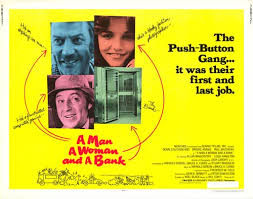
A MAN, A WOMAN AND A BANK (A VERY BIG WITHDRAWAL)
Canada, 1979, 100 minutes, Colour.
Donald Sutherland, Brooke Adams, Paul Mazursky.
Directed b Noel Black.
A Man, A Woman And A Bank (A Very Big Withdrawal): There have been bank robberies aplenty and this one is no better, no worse. It's done by computer rather neatly but not particularly startlingly. The theme of man conquering machine is a popular one. The characters are quite well drawn and, in fact, the strength of the film lies in the Donald Sutherland's easy charm, Paul Mazursky's comic touches and Brooke Adams' vivacious heroine. Besides a trip to Macao, we have a very attractively photographed Vancouver. A lot of attention is given to details of planning the robbery. While the presuppositions about crime and punishment are pleasantly and unrealistically amoral, the film makes it look as if robbing four million might really be possible. Direction is by Noel Black, writer-director who made such films as Pretty Poison and Jennifer On My Mind.
1. The popularity of robbery caper films during the seventies? The reason for the appeal? The tradition of such films over the decades?
2. The contribution of the Vancouver backgrounds of the film, the visits to Macao? Colour photography, editing, Bi11 Conti musical score, song?
3. The humorous tone of the film, even as regards the morality of robbing banks and getting away with it?
4. The picture of skills, computers, engineering? The skill in robbing banks and getting away with it?
5. The purpose of the film: popular entertainment, romance story, crime caper? The values of right and wrong underlying it?
6. Donald Sutherland's style: his plans with Norman, the convictions of his personality, errors? The negotiations in Macao? His stealing the plans and being photographed? The encounters with Stacey to get the photos, falling in love with her, sharing the outings, his jealousy of Peter? The development of the plans with Norman? The visits to Macao and Stacey's visit? The building up to the night of the robbery, the plans, the transport of the clothes, the disguise as a priest? His cool participation in the robbery? Being held up for the parking ticket, the bail? The happy ending?
7. Stacey as heroine, her work with photography and advertising, wanting to promote Reese's picture, her liaison with Peter and his odd behaviour? The outings with Reese and falling in love with him? Peter and his pretending to have taken the pills? Going to Macao and enjoying the trip? Bailing Reese out, the realisation of the truth, going off to Macao at the end?
8. Paul Mazursky's comic style as Norman? The credits and the van and the computer? His skill with computers? His fears about the plan, his decision to go along with it? His relationship with his wife, phone calls, the divorce? The carnival outing with the girl and falling in love with her? Condering about making a fool of himself? The apprehensions about the job? His computer control during the robbery, the happy ending? A comic character and his apprehensions, the sequence on the lift, weeping with the success?
9. The character of Peter, his relationship with Stacey, his following Reese in the car, his neurotic behaviour?
10. The light touch, the plans, the sense of play, the overseas trips, the bank itself, computers, the police? suspense during the robbery sequence? The sense of achievement? The continued popularity of this kind of film?
Published in Movie Reviews
Published in
Movie Reviews
Tagged under
Saturday, 18 September 2021 19:32
Man Alone, A
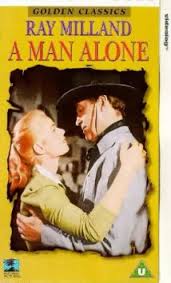
A MAN ALONE
US, 1955, 85 minutes, Colour.
Ray Milland, Mary Murphy, Raymond Burr, Ward Bond.
Directed by Ray Milland.
A Man Alone is one of Ray Milland's early attempts at direction. He made The Thief in 1953 and Panic in Year Zero in 1961. In The Thief only the natural and artificial sounds were included, no dialogue. Milland repeats this quite effectively in the first half hour of this film. It is well done in itself, but is also interesting to note how much can be communicated by moving images without words. The story is conventional enough about big bosses, corruption, killing, greed and the test of loyalties (reminiscent in ways of High Noon), but the treatment is terse, dramatic and, on the whole, this is a good Western worth seeing.
1. What mood and angle for a Western does the title indicate?
2. Did the film live up to this title?
3. No words were spoken for the first half hour or so. Did you notice this? What effect did it have, the use of background noises, the importance of actions, especially facial gestures and the use of eyes? How does this illustrate how much can be communicated without words?
4. How did the environment contribute to the mood of the film, the desert, the town, the sand covering the houses etc.?
5. What did the sequences with the looted stagecoach show about the West, the murderers, the hero?
6. The hero emerged from the desert, did a work of mercy and then entered the town. What kind of man was he? Did you like him? Were you surprised to find that he had been a gunman?
7. Was the hero's discovery of the villains well done? what did this sequence tell you about the town and the men who ran it?
8. How was the hero's night in the cellar also a good example of visual, non-verbal communication?
9. What was the relationship between father and daughter? Why was he so strict? Why did she go down to the cellar to admire the dresses?
10. Were you surprised that the father was in league with the villains?
11. What did the film show about the towns and societies of the west, their fear of power, their readiness to take justice into their own hands. their readiness to lynch people. their failure to rally to a good man standing for justice?
12. What decisions did the father have to make?
13. What future was there for the hero and heroine, for the town?
14. How were the usual Western conventions, siege, shootout, lynching, strong hero who can shoot accurately, used in this film? Conventionally or with a difference? How? Was this an average Western or a better class Western? Why?
Published in Movie Reviews
Published in
Movie Reviews
Tagged under
Saturday, 18 September 2021 19:32
Mamma Roma
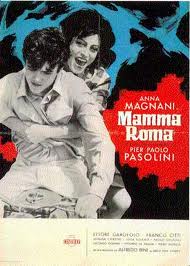
MAMMA ROMA
Italy, 1962, 106 minutes, Black and white.
Anna Magnani, Ettore Garofalo, Franco Citti.
Directed by Pier Paolo Pasolini.
Mamma Roma was Pier Paolo Pasolini's second film. The prominent novelist, poet, philosopher had moved into films with a version of his novel A Violent Life, Accatone. In the mid?'60s he was to make The Gospel According to St. Matthew and in the late '60s move into his adaptation of classical stories and myths: Oedipus, Medea. In 1970 he began his mediaeval trilogy: The Decameron, Canterbury Tales, Arabian Nights. His last film was the controversial Salo or The 120 Days of Sodom. Pasolini had a brief but distinctive career and contribution to Italian cinema.
The film is a strong vehicle for Anna Magnani. She is a very strong screen presence, a presence in Italian films from the '40s to the early '70s. She won an Academy Award for her performance in Tennessee Williams' The Rose Tattoo in 1955. Also appearing in the cast is Franco Citti, the star of Accatone and of many of Pasolini's films.
1. A portrait of Rome? Roman characters? The perspective of Pasolini?
2. Black and white photography, the wastes and suburbs of Rome? Authentic atmosphere? The choice of the Vivaldi music and its use throughout the film?
3. Anna Magnani's screen presence and contribution to the film?
4. The world of pimps, prostitutes, gangs? Urban Rome of the '60s? Its look (the youth wearing suits), lifestyle, crime?
5. Mamma and her verve? The wedding and her song, carrying on? Relationship with Carmine? Her relationship with Ettore: the new house, love for her son, the sequences in the apartment, dancing, the bike ride, the fruit stall? Her concern about Bruna? Gossips, her intervention? Friends and blackmailing the wealthy man? Carmine and his wanting her on the streets? The priest and the church? Prison? Her love for her son, concern, her final grief?
6. Ettore and his past, mother and father, age, returning to his mother, the gang and the lifestyle around the suburbs of Rome, card games etc., falling in love with Bruna, the gold chain (and the selling of the records), sexuality, job, the tenderness of his mother, the companions, the arrest, his treatment, the being tied down, his deterioration and madness, his death? The pathos of the Roman son?
7. Carmine as a pimp, the marriage, pigs, songs, hold over Mamma?
8. The prostitutes of Rome, personalities, plying their trade, their tricks, the elaborate blackmail of the wealthy businessman?
9. The stall people, their work, noticing everything, gossiping?
10. The boys, idle, forming gangs, peer pressure, passing their time, robbery, violence, sexuality?
11. The picture of the Catholic Church, its place in Italian society, Mamma and the Mass, the support of the priest?
12. The law, its attitudes towards Mamma? Towards her son? The impersonal and cruel treatment of Ettore?
13. The detail of Pasolini's presentation of characters, idiosyncrasies, behaviour, situations? His sympathetic perspective? A Roman slice of life?
Published in Movie Reviews
Published in
Movie Reviews
Tagged under
Saturday, 18 September 2021 19:32
Mame
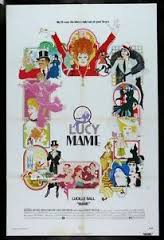
MAME
US, 1974, 131 minutes, Panavision.
Lucille Ball, Beatrice Arthur, Robert Preston, Bruce Davison.
Directed by Gene Saks.
Mame must have been made for audiences who long for the old days of big bright musicals, song and dance routines, the spectacularly staged numbers and the lavish costumes. And one of the stars of stars is there, Lucille Ball, a sprightly 63; and then Robert Preston appears as Beauregard. For today's audiences, Beatrice Arthur (Maude) is quite funny as the actress Vera Charles; Bruce Davison (Willard, etc.) is the older Patrick. It is all amiable and enjoyable, especially for those who don't go often to films. I enjoyed the skit on the 1920s Broadway musical and Mame's encounter with the Connecticut snobs best. It made Mame seem, despite her eccentricities, very likeable.
1. An enjoyable musical? why are musicals enjoyable? Why are they so big and booming? (Do they justify the enormous expense on them? why?) What audience was this musical directed at? The older audience for the stars? The nostalgia audience? The younger audiences and their identification with Patrick? Families? Why?
2. How successful was the visual collage during the titles? What was the meaning of it? What atmosphere was it meant to create? Comment upon the use of the visuals, the covers, the music.
3. Was the story seen from Mame's point of view or from Patrick's? How important was this for appreciation of what happened?
4. How attractive a personality was Mame? Did it matter that she was eccentric? How much was Lucille Ball to be identified with the character of Mame? Her first appearance at the party and her liveliness and her way of life? Her wealth and her use of time and wealth? The quality of her friends? Vera Charles?
5. Mame's style of life? Her being confronted with her nephew? Her inability to relate to him properly? The school that she chose to send him to? How did she grow in understanding and loving him? What was the change that Patrick made in Mame's personality?
6. How well did the film present Patrick? Feelingly or sentimentally? The fact that the film began with him? Patrick as an orphan? People's horror at his being entrusted to Mame? Agnes Gooch's suspicions? His initial relationship to Mame at the party and his sliding down the banister? The morning after the party and his learning to know Mame?
7. Patrick at school, etc.? What kind of upbringing did he have? Was Mame's overall effect on him positive or detrimental? Why?
8. How important was wealth for this story? How does wealth enable people to do what they like? Would the story have been much different if Mame was not wealthy?
9. The contribution of Agnes Gooch and the butler to the atmosphere of the story? Merely figures of humour? Suspicions of Mame and liking of Mame? Agnes Gooch and her suspicions of Mame? Her love for Patrick? What changes did Mame have on Agnes Gooch? With the theme of wealth in the film, how important was the depression? How prepared was Mame for a depression? what effect did it have on her? Did it change her for the better? How well did she cope?
10. How humorous were the situations where Mame had her jobs? Especially the sequence in the shop and Mame on the roller skates? How did it indicate Mame's inability to handle responsibilities? Did this detract from her personality at all?
11. How romantic a figure was Beauregard? His entrance into Mame's life? His southern manners and style? The trouble he took to see her out? was he a good man?
12. How vivid was the picture of the South in the film? The wealth and mansion? The fact that Mame was used to wealth and Beauregard was rich? Mame's lack of being at home in the South but her coping? Beauregard's fiancee and her treating of Mame? The mother's boorishness and her attitude towards Mame? The sequence of the hunt. How humorous was the sequence in itself? Was it well done as comedy? The Lucille Ball style comedy? The irony of its being a best success and Mame's being feted? The song and the dance at the hunt? How was this a climax to the first part of the film? Successfully so?
13. How did Mame discover happiness with Beauregard? How happy was she? How did Beauregard's song sum up the relationship between himself and Mame? How well did the film handle Beauregard's death? With reticence? Mame's grief?
14. Did this successfully breach the transition between Patrick as a boy and Patrick grown? What was your first impressions of Patrick as a man? Was he a sympathetic character? Could you believe that he was really in love with Gloria? What kind of a girl was Gloria? How lovable was she? What did Patrick see in her? How did she measure up to Mame? Was this important that Gloria should be contrasted with Mame? Why?
15. How important was Vera Charles in the film? As a comic character? As contributing to the plot? The fact that she gave Mame the job on the stage? How humorous a situation was this? Why was it funny? The parody of the twenties musicals? The words of the song and the style of the staging? Was it any funnier than Mame's mistake? Why did Vera reappear at this stage of Mame's life? The importance of meeting in the restaurant? Their song together? Their love hate relationship?
16. Why did Mame and Vera prepare to intervene in Agnes’s life? Did this fit in well with the rest of the film? Were they cruel to Agnes in dolling her up? How naive was Agnes? Were you surprised when she became pregnant? Could she cope with such a situation?
17. How humorous were the sequences between Mame and Gloria's family? Why were they humorous? What was being satirised? How strong was the satire? How well was it done ? in the personification of Wasps in Gloria's mother and father? Their prejudices etc.? Why did Patrick want to marry into this family? Was this credible?
18. Did you agree with Mame's tactics in breaking up the marriage? In reintroducing Agnes? In the mother's arriving and the fact that she had bought the property? What effect did this have on Patrick?
19. The film ended happily with Patrick's marriage and his son and the son's grand-aunty Mame. Was this a proper ending of the film? Why?
20. What values did the film stand for? Were they well presented? How well did the film balance the songs, the dances, the comedy and the exploration of those?
Published in Movie Reviews
Published in
Movie Reviews
Tagged under
Saturday, 18 September 2021 19:32
Mambo
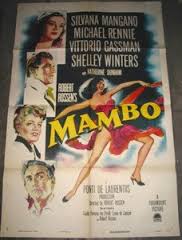
MAMBO
Italy/US, 1954, 110 minutes, Black and white.
Silvana Mangano, Vittorio Gassman, Shelley Winters, Michael Rennie, Katherine Dunham.
Directed by Robert Rossen.
Mambo is a melodramatic oddity. It is an American/Italian co production of the early '50s, at the period of de Sica's Indiscretion of an American Wife and Mankiewicz's The Barefoot Contessa. Based on a story of Ennio de Concini, the film had many scriptwriters including the American director and writer Robert Rossen (Body and Soul, the Oscar winning All the King's Men, Alexander the Great etc.) The film was considerably cut and reedited after the initial editing. The film boasts an interesting cast, though the English and American cast handle the Italian atmosphere with some unease. Dancer Katherine Dunham and her troupe are featured with considerable interest.
The film's material is conventional and the treatment in the final version of the film is also fairly conventional. (Of historic interest, the film is a co production of later production magnates Carlo Ponti and Dino de Laurentiis.
1. The impact of the film? As an Italian film? An American/Italian co production? For an Italian audience? Universal audience?
2. Black and white photography: atmosphere of Italy, especially Venice? Authenticity of locations and sets? The importance of the musical score? The atmosphere of cabaret and ballet? The atmosphere of the Mambo? The special effects? The questions of editing and reediting and their impact on continuity, dramatic presentation of character, flashbacks?
3. The atmosphere of Italian realism and its development in the '50s? The blend of realism and interpretation of character in heightened and melodramatic circumstances? The conventional nature of the basic plot? the shop girl, ambitions, falling in love, criminals, the upper class, American management, the fulfilment of dreams?
4. The plausibility of the plot? Familiarity? Sufficient for audiences to accept the situations? The characters? The hothouse atmosphere and the melodrama? Romance, betrayals, driving ambition, deaths?
5. The focus on Giovanna? The interpretation of Silvana Mangano? Her status in the Italian film industry of the '50s? Her shop girl background, ambitions? Her tenement dwelling? Poverty? Her love with Mario and his black market background? The casino? The encounter with Enrico and the masked ball? Her reaction to the Count's attack on her? Her dancing, the attraction of Toni and her invitation to join the troupe? Katherine Dunham and her company? Giovanna's joining the troupe, driven hard by Toni and her becoming a star? Her return to Venice and the changed attitudes? The new encounter with Giovanna? Toni's intervening? Her death and its repercussions? The reappearance of the Count and his proposal? The confrontation with Mario and the discovery of the Count's illness? His persuading Giovanna to marry, the motive of greed? Giovanna falling in love with the Count? The fight? Her renunciation, the money, her deciding to become a famous dancer? A sympathetic portrayal of this kind of girl?
6. The contrast between the two men? Vittorio Gassman and his style, Michael Rennie with the English background? Mario and the slick operations in Venice, work at the casino, plans, the relationship with Giovanna? Her leaving him? His asserting influence over her, the greed and the pressures on the Count, the fight? Enrico and his background, society, wealth, the masked ball, his impulsive attempt to make love? His patronage? The proposal? Her genuine love for him? His death?
7. Shelley Winters' style as Toni? Her professionalism, the background of her failing as a dancer, management, her vicarious success through Giovanna? Her influence as regards Giovanna’s private life? Toni's anger about Mario? Her death in the accident and the contrivances of the plot?
8. Katherine Dunham and her particular style of dancing, her company, its success? The contribution of the dance troupe for the music of the film, its style? Authenticity? Katherine Dunham's choreography?
9. The background in Italy: Giovanna and her work, home, relationships? The influences in her life? The contrast with the Marisoni family? Their style, affluence, snobbery? The background of the Italian world of black markets, gambling, casinos?
10. The focus of the title, musical style, the style of the '50s? As a symbol of society and of Giovanna?
11. The morbid tone of the film? The heavy touches? How satisfying as entertainment ? the background of the times? Later decades?
Published in Movie Reviews
Published in
Movie Reviews
Tagged under
Saturday, 18 September 2021 19:32
Malta Story, The
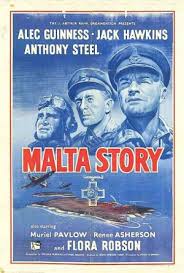
THE MALTA STORY
UK, 1953, 103 minutes, Black and white.
Alec Guinness, Anthony Steel, Muriel Pavlow, Jack Hawkins, Flora Robson, Renee Asherson, Ralph Truman, Reginald Tate. Hugh Burden.
Directed by Brian Desmond Hurst.
The Malta Story is one of many war tribute films, all more or less similar. This film has the advantage of a screenplay by William Fairchild (author and director of Silent Enemy) and novelist Nigel Balchin. The film has excellent credits and is a civilised piece of film making.
Alec Guinness is fairly straight up and down in the central role, not exactly the romantic hero. Jack Hawkins and Anthony Steel go through familiar routines as officers. Muriel Pavlow is attractive as a Maltese girl. Flora Robson has a strong role as her mother. There are war action sequences, suggestions of the plight of the Maltese during the war, the possibility of espionage. Not outstanding, but a creditable example of the '50s British war tributes.
1. The popularity of this kind of war tribute? In the '50s? Later decades? The quality of the film as air action warfare? The human elements? Romance? A tribute to the Maltese?
2. The black and white photography, the use of Maltese locations? An authentic atmosphere? The war period and its atmosphere, pressures on the population? British occupation? Aerial photography? William Alwyn's rousing score?
3. The title and its focus on Malta? Its place in the British Empire? Place in the Mediterranean? German interests? The population and their attitudes towards the British? Their support of the British? Divisions in families with some members loyal to the Italians or to the Germans? The place of Malta in the winning of World War Two?
4. The focus on Peter Ross? Alec Guinness' style as air hero? His background, skill as a pilot? His background as an archeologist? His skills in aerial photography? The clashes with the officers? Obedience and disobedience? His discovery of war plans? The transportation of food and arms? The raids, the encounter with Maria, friendship with the family. falling in love? His response to Maria's mother? The traitor in the family ? and his discovery., capture, execution? Ross' involvement in the aerial attacks? Difficult missions in photography? His achievement? Reunion with Maria? Conventional British war hero?
5. The presentation of the British - Jack Hawkins and Anthony Steel as British officers? The realism in the presentation of the officers, their work, skills? Dealing with one another? Decisions in war?
6. The portrait of the Maltese: Maria and her work on the island. attractive, intelligent? Attracted towards Ross, falling in love? Home sequences? Maria's mother and her embodying the spirit of Malta? Her grief at her son's espionage and execution? The credibility of the boy spying for the Italians? The range of people presented in Malta, going about their ordinary lives, the siege, starvation? Coping? Contribution to the winning of the war?
7. The range of minor characters, especially the delineation of British officers and personnel?
8. The interest of the plot, the work of the aerial photographers and their difficulties, contribution to the war, aerial warfare?
9. A solid tribute to the Maltese? A memoir of the experience of warfare in World War Two?
Published in Movie Reviews
Published in
Movie Reviews
Tagged under
Saturday, 18 September 2021 19:32
Lucas
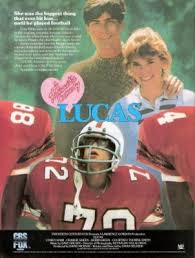
LUCAS
US, 1986, 100 minutes, Colour.
Corey Haim, Kerri Green, Charlie Sheen, Winona Ryder.
Directed by David Seltzer.
Lucas is a pleasing film about young adolescents, on holidays, at school, their emotional ups and downs, decisions. It was written and directed by David Seltzer, the author of The Omen, writer and director of the Tom Hanks, Sally Field comedy Punchline. He has a sensitivity towards the children of this age and gets an excellent performance from Corey Haim (Murphy's Romance, The Lost Boys, Licensed to Drive) as the precocious Lucas. There is also an engaging performance from Charlie Sheen as the sports minded youngster who takes Lucas's side, as well as from Kerri Greene as the young girl.
The film has a lot of familiar material but somehow or other the strength of the characterisations, the charm of many of the situations as well as the humour, makes this a much more insightful film into young adolescents. There is an attractive musical score by Dave Grusin. (Charlie Sheen was to move from this film to Platoon and Wall Street, Corey Haim was to make a transition into a young adult star, Winona Ryder was soon to appear in Square-dance and Heathers.)
1.The appeal of the film? Picture of youth, emotions, relationships?
2.The small town, its environment, the school? The range of songs?
3.The prologue and the insect, the cocoon, shedding the cocoon, the new insect and its ability to fly, to become beautiful? As applied to Lucas and Maggie, Rena, Cappie? And the later incidents with the bugs, Lucas's explanations, the youngsters killing them?
4.The portrait of Lucas: with the bugs, seeing Maggie on the tennis court, his nervousness, watching her, talking with her, their becoming friends and sharing, in the parks, at the concert in the sewers? Being dropped off at his house? Stories about his parents? The opening of school, seeing Maggie, talking with Rena, the various versions of the suicide of the boy? The footballers going on stage and taking him, his comedy routine? Maggie's response? Going to see The Fly, the fat boy in the foyer, the footballers and their taunts, Cappie and his standing up for Lucas, the bond between them? Seeing Cappie and Alise kissing in the cinema? The car ride, the crash, the sequence with the bug and the youngsters killing it? Seeing Maggie more attracted to Cappie, playing in the band, talking to Rena, the dance and his getting the clothes, coming on the bike, finding Cappie and Maggie together, their going to eat pizza, his angers, talking to Rena by the water? Going to the football tryout, talking with Cappie and Cappie saying that they were friends, his demands to play and his explanations to the coach, his talking with Maggie and his angers and regrets, his moodiness, going to play football, the comic routines on the field, knocked out, in hospital? Maggie talking to him in the hospital, his return to school, the class giving him the jacket and the final cheer? The truth about his family? Intelligent, precocious, his philosophy of openness, creativity?
5.Maggie, playing tennis, attractive, her age, interested in Lucas, his opening up the world to her, her reaction to him on the stage, sharing so much, attracted towards Cappie, going to be a cheerleader, clash with Lucas about superficiality, the cooking class, washing Cappie's shirt, attracted towards him, not going to the dance but going out with him, her going to the hospital, sharing with Lucas at the end?
6.Cappie, attractive young man, footballer, standing up for Lucas in the cinema, his relationship with Alise, driving the car, friendship with Maggie, the cooking, the washing, the break-up with Alise, the episode after the dance, talking to Lucas in the shower room, declaring that Maggie and Lucas were only friends, the football field?
7.Rena, her wanting a date with Lucas, talking with him, the talk about the bugs, attractive friendship?
8.The fat boy, his taking videos, the insults in the cinema? Standing up for himself?
9.The footballers, their tough actions, lording it over others?
10.Alise, her place in the school, the cheerleaders? With Cappie, the break-up? Clash with Maggie?
11.The atmosphere of the school, classroom, the teachers, the supervisor and the discussion about Lucas playing football, the football coach and Lucas being harsh on him, the place of sport, the school bullies, friendships?
12.Themes of relationships, puppy love, hurts and affirmation?
Published in Movie Reviews
Published in
Movie Reviews
Tagged under
Saturday, 18 September 2021 19:32
Little Nikita
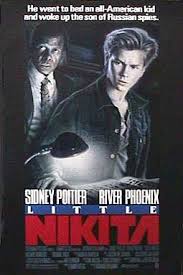
LITTLE NIKITA
US, 1988, 98 minutes, Colour.
Sidney Poitier, River Phoenix, Richard Bradford, Richard Lynch, Caroline Kava.
Directed by Richard Benjamin.
Little Nikita is a watchable, though not particularly well made, rather far-fetched espionage story. It concerns Soviet sleepers in the United States, in the San Diego area. A rogue spy is killing them off, demanding money from the Soviets. It is the era of Gorbachev and Glasnost. However, Soviet KGB wants the killer taken. An exemplary married couple are the last victims. Their son Jeff wants to be in the American air force. An FBI agent reveals the truth to him - and the expected action sequences follow.
River Phoenix is quite good, very serious, as Jeff. Sidney Poitier is his earnest self as the FBI agent. Richard Lynch is, as in so many of his later films, the perfectly repulsive villain. San Diego looks very good and is an effective setting. Direction is by Richard Benjamin - perhaps more at home with comedies (My Favourite Year, My Stepmother Is An Alien, Money Pit).
1.Enjoyable spy story? American- Soviet relationships? American families and patriotism?
2.San Diego settings, the city, the homes, the bay? The trolley to the border? Musical score?
3.The title and the focus on Jeff, everybody's relationship to Nikita?
4.The opening with Scooba: the renegade spy, the brutal murders, his character, demanding $200,000? His killing the Soviet agent on the ferry? The build-up to the confrontation?
5.Karpov: 20 years' experience, planting the sleepers, his arrival in Mexico, going into San Diego, his contacts, surveillance, the shower and Scooba's threatening him, the employment of Elizabeth and Richard?
6.Jeff and his family, working in the nursery, his ambitions to go into the air force, his friends, the interview, the meeting with Roy? The questions and his nervousness, awkwardness? Not telling his parents? Not having his licence, trying to get it back, Roy getting it? Roy's discussion, the selling of cadetships? Roy and the buying of the plant, moving in across the street? Jeff's anger with him? Talk, playing basketball? Roy's bluntly telling him the truth? His reaction, disbelief, going out, ringing Barbara, going to run away? His return? Tension at home, the argument about the clutch of his car, the money, the question of the truth? His finding the documents? Going to Roy and finding him in bed? His anger at the bar, the confrontation? At home, the truth with his parents, the phone call, going across the street, Karpov and the interview, telling him his name? Leaving the cigarette clue? In the car with Karpov, preventing him shooting Scooba? On the trolley, Scooba taking him as hostage, the end, the reconciliation?
7.Roy and his FBI work, the 20 years, the death of his partner, the file? Hostility to Scooba? His interview with his superior, getting the job, unofficially? Interviewing the cadets, the computer and the information about Jeff's parents? Meeting Jeff, with the licence, driving with him, the plant, moving in? His liking for Jeff? Trying to find out the truth? Trying to track down Scooba? Friendship with Miss Mc Lachlan, the file, the relationship? Finding the cigarette, the shooting of Scooba, following with Scooba, the trolley? Karpov and Roy shooting Scooba?
8.Karpov and his contacts, the ballet, at Roy's house, the exchange of Scooba and Jeff? The shooting of Scooba, his return to Mexico?
9.The Grants as sleepers, their American way of life? Discussions with Jeff, the plants, the irony of their hidden documents? The story of their past, the father and the black market, the training? Elizabeth and her ballet school? The fish and the bullet? The code, going to the ballet, refusing Karpov? The confrontation with Jeff, the truth? Going on the mission with the money? The chase? Final reconciliation?
10.Jeff and his ordinary way of life, his friends, going for the interview? Barbara, the drive-in (and Roy watching him at the drive-in)? The plan to run away? Barbara's refusal?
11.Enjoyable elements - but how plausible? Effective thriller? Espionage systems? American- Soviet relationships?
Published in Movie Reviews
Published in
Movie Reviews
Tagged under
Saturday, 18 September 2021 19:32
Love, Valor, Compassion
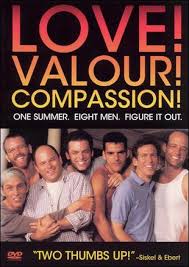
LOVE, VALOR, COMPASSION
US, 1997, 110 minutes, Colour.
Jason Alexander, Randy Becker, John Glover, John Benjamin Hickey, Stephen Spinella.
Directed by Joe Mantello.
Winner of several Tony awards in 1995, Terrence McNally's play is about a group of gay men who meet on three American holiday weekends at an upstate house. There they interact, both ferociously and lovingly. It is familiar material from quite a number of films about AIDS. In fact, some gay groups have criticised the film for simply presenting a collection of stereotypical characters. It probably does. But the important thing is how they are presented. Much is humorous, much is irritating, much asks for empathy.
John Glover (who won a Tony) plays English twins who act as catalysts for the interactions. Jason Alexander successfully portrays a flamboyant expert on Broadway musicals. Much of the humour is camp. Much of the action focuses on relationships and struggles.
1.A celebrated play with many awards, Tony Awards? The adaptation for the screen? The cast from the theatre and the director? (With his first film?)
2.The opening up of the play: the scenes in the car and on the roads, in the house and the grounds, the lake? The musical score?
3.The title, the comment on the AIDS situation and gay men, especially in the United States, coping?
4.The gay sensibilities of the film (and the critique by many gay reviewers that it perpetuated stereotypes?): the world of men, their lives and careers, relationship, hurts, AIDS, collaboration? Partnerships, casual and long term? Fidelity, affairs? Men in a world without women?
5.Greg and his voice-over, his perspective on the action of the film? His house, the host? The holidays, the comments on the various characters? His final comments about their deaths and his burying them all? The device of Greg talking about their deaths and the men themselves talking about how long they had to live, the circumstances of their deaths?
6.The structure of the film: the three public holidays and the time at the lake? The time of the year, the seasons, the summer and the fall? The introduction of the characters, their interactions and relationships?
7.The film's perspective on American gay men, their personalities and style, American sensibilities? The contrast with James and John and the British? The perspective on AIDS?
8.The character of Greg: host, his house, the tour of the house for the audience during the credits? Age and experience, his ability and dancing, choreography, the block in his creativity? His relationship with Bobbie? The harmony of their relationship on the surface? Tensions beneath the surface? His reaction to Bobbie's relationship with Ramon? Bobbie and his telling the truth, Greg hurt, ordering him out of the house? Bobbie's crisis and the death of his sister? Their parting, the possibility of reconciliation? Greg and his welcoming of all the men, the discussions, the disputes, especially at the meal table with John, his stances? The rehearsal for the benefit and Swan Lake? His presiding over the events?
9.Bobbie: his blindness, his age and life, his relationship with Greg, the permanence of the relationship and their expectations? The ride in the car with Perry and Arthur? The discussions with them? The encounter with Ramon, the episode in the kitchen and its consequences? Arthur and the discussions, the support? The rendezvous with Ramon at the lake? The phone call, his grief about his sister's death? Telling Greg the truth? Greg not being able to accept it? Bobbie going to his sister's funeral - but being ousted from the house? His comments on his death and his not being in a relationship with Greg?
10.Perry and Arthur, the 14 years together, previous relationships? Especially with John? Perry and his being raucous, loud opinions, the drive in the car and the interchange with Arthur? The couple and their bickering, reconciliations? The intimacy of their scenes together? The discussions at the table and Perry's bluntness, his chauvinism and racism? The reaction of the others(??) Ramon's response? Arthur and his telling Perry about his effect? The ease between them, Perry's reaction to Arthur and the nudity? Arthur and his being conventional, his comment about not having the usual symptoms of the gay lifestyle, especially opera and the arts? His fidelity to Perry? Their infidelities? Arthur and his support of Bobby? Perry and the past relationship with John, the encounters with John, the angers and tension? The meal table? The anniversary celebration? Perry and his going with Buzz into John's room and overhearing John and his intimate conversations and reminiscences about the past? The future of Arthur and Perry?
11.Buzz as the more flamboyant gay man? His being infected with AIDS? His love for the American musicals and his continual quoting and references, singing? The flamboyant carry-on? His coming alone? The past relationship with John? His loneliness, the scene where he was wearing nothing but the apron? Going with Perry to listen in to John's relationship with Ramon? His personal fears? The arrival of James, the attraction, the bonds, the tenderness, his wanting to look after James? The comments on both their deaths and the fact that James would not allow Buzz to look after him, even though he relied on him and loved him?
12.Ramon, the younger man, the dancer and his dancing, modern attitudes - not knowing who Julie Andrews was! His coming with John, his returning with him at the various weekends? His explanation of himself as happy and proud as a gay man? The attraction to Bobby, the episode in the kitchen? The rendezvous at the lake - interrupted by the phone call? His sitting at Bobby's door? His relationship with John, in the room, being tied up - yet listening to the great detail of John's story about Patrick? His response? His reaction to Perry at the table? His being frank, open, comfortable in the nudity? The contrast with the backgrounds and styles of the older men? His future, his death?
13.John as a twin, his bitterness, his British background? The past relationship with Perry and the tensions? The relationship with Buzz and their being comfortable with each other? His bitching and his criticism? Playing the piano? The disputes at the table, arguments, being alone? His jealousy of James? Wanting his parents' affection? The importance of telling the story of Patrick and the seduction to Ramon? His opening up his deepest feelings? His being overheard by Perry and Buzz and his anger? The interchanges with James, the possibilities of a reconciliation before James's death?
14.The contrast with James, his being a twin, more gentle in his approach, the dramatic arrival, his style, the effect of AIDS? Tenderness, the friendship with Buzz? His illness and Buzz tending him? His coming to the rehearsal for the ballet? The effectiveness of John Glover acting the two parts - but their being rarely together (and the structure of the film to keep each of them out of scenes where the other was)?
15.The issue of the benefit, Perry not wanting to participate, the rehearsal of Swan Lake - and the context of looking forward to their deaths?
16.The finale, their going for the swim, the nudity, their sharing in the exhilaration of the form night and the swim? Moments of hope?
Published in Movie Reviews
Published in
Movie Reviews
Tagged under